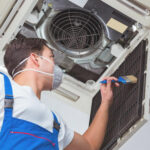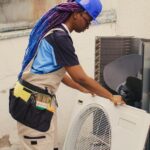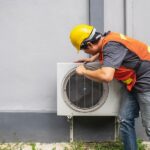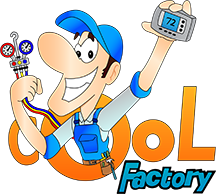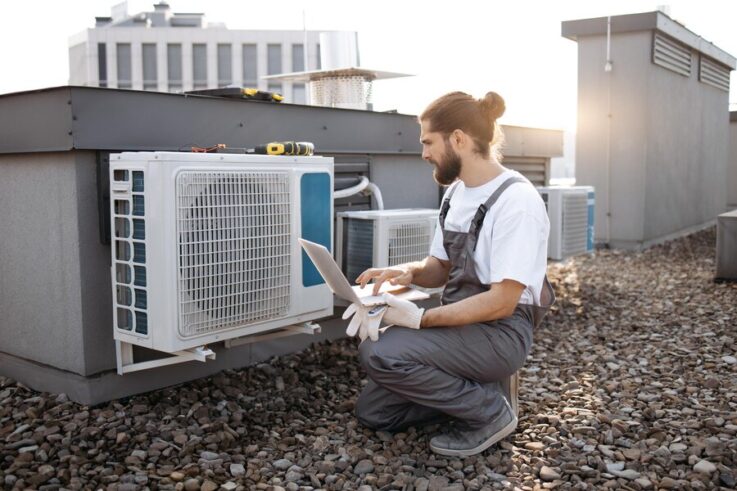
Key Factors to Consider When Upgrading Your HVAC System
Key Factors to Consider When Upgrading Your HVAC System
HVAC systems play a vital role in maintaining comfortable indoor environments, regulating temperature, humidity, and air quality. When it comes to upgrading your HVAC system, several key factors need careful consideration to ensure optimal performance, energy efficiency, and cost-effectiveness. From assessing your current system’s efficiency to selecting the right size and type of equipment, each decision impacts the long-term comfort and sustainability of your space. Let’s delve into the essential considerations you should keep in mind when embarking on the journey of upgrading your HVAC system.
Importance of HVAC Upgrades
Upgrading your HVAC system is crucial for maintaining comfort and optimizing energy usage in your home or workspace. Aging systems may struggle to meet modern efficiency standards, leading to increased energy bills and reduced comfort levels. By investing in upgrades, you not only enhance the performance of your HVAC system but also contribute to a more sustainable environment by reducing energy consumption and carbon emissions.
Additionally, modern HVAC systems often come with advanced features that improve indoor air quality and provide better control over temperature and humidity levels, ensuring a healthier and more comfortable living or working environment.
Efficiency Assessment
Before embarking on an HVAC upgrade journey, it’s essential to conduct a thorough efficiency assessment of your current system. This assessment involves evaluating factors such as the age of the equipment, its condition, and its ability to meet your heating and cooling needs efficiently.
A professional HVAC technician can perform tests and inspections to determine the system’s energy efficiency and identify any potential issues or inefficiencies. This assessment serves as a foundation for making informed decisions about whether to repair or replace components and helps you understand the potential energy savings and benefits associated with upgrading your HVAC system.
Sizing Considerations
When upgrading your HVAC system, selecting the right size equipment is crucial for optimal performance and efficiency. Oversized units may short-cycle, leading to excessive energy consumption, uneven temperatures, and premature wear and tear on components. Undersized units, on the other hand, may struggle to adequately heat or cool your space, resulting in discomfort and increased energy bills.
A professional HVAC contractor can perform load calculations to determine the appropriate size for your system based on factors such as square footage, insulation levels, and local climate conditions, ensuring that your new equipment operates efficiently and effectively.
Equipment Types
Choosing the right type of HVAC equipment is another key consideration when upgrading your system. There are various options available, including furnaces, heat pumps, air conditioners, and ductless mini-split systems, each with its own advantages and limitations. Furnaces are typically used for heating and rely on ductwork to distribute warm air throughout the building. Heat pumps offer both heating and cooling capabilities and are highly efficient, especially in moderate climates.
Air conditioners provide cooling by removing heat from indoor air and are ideal for warmer regions. Ductless mini-split systems offer flexibility and zoning capabilities, making them suitable for spaces where ductwork is impractical. Evaluating your specific heating and cooling needs, budget, and space constraints will help determine the most suitable equipment type for your upgrade.
Energy Efficiency Ratings
Understanding energy efficiency ratings is essential when upgrading your HVAC system. Systems with higher efficiency ratings consume less energy to produce the same level of heating or cooling, resulting in lower utility bills and reduced environmental impact.
Key energy efficiency metrics to consider include Seasonal Energy Efficiency Ratio (SEER) for air conditioners, Annual Fuel Utilization Efficiency (AFUE) for furnaces, and Heating Seasonal Performance Factor (HSPF) for heat pumps. Higher SEER, AFUE, and HSPF ratings indicate greater efficiency, but it’s essential to balance upfront costs with long-term energy savings to find the most cost-effective option for your needs.
Cost Analysis
Performing a comprehensive cost analysis is vital to determine the financial implications of upgrading your HVAC system. This analysis should consider various factors, including the initial purchase price of the equipment, installation costs, ongoing maintenance expenses, and potential energy savings over time. While more efficient systems often come with higher upfront costs, they can lead to significant long-term savings through reduced energy bills.
Additionally, consider any available rebates, incentives, or financing options that may offset the initial investment. By carefully weighing upfront expenses against potential savings and incentives, you can make an informed decision that maximizes the value of your HVAC upgrade.
Environmental Impact
When upgrading your HVAC system, it’s essential to consider the environmental impact of your choices. Older, inefficient systems consume more energy, contributing to higher greenhouse gas emissions and environmental degradation. By opting for newer, more energy-efficient equipment, you can reduce your carbon footprint and mitigate the environmental impact of heating and cooling your home or business.
Additionally, some HVAC systems use environmentally friendly refrigerants that have lower global warming potential, further minimizing their ecological footprint. By prioritizing sustainability in your HVAC upgrade decisions, you can play a role in protecting the planet for future generations.
Maintenance Requirements
Understanding the maintenance requirements of your upgraded HVAC system is crucial for ensuring its longevity and efficient operation. Regular maintenance helps prevent breakdowns, extend the lifespan of your equipment, and maintain optimal performance and energy efficiency. Tasks such as changing air filters, cleaning coils, lubricating moving parts, and inspecting ductwork should be performed regularly by a qualified HVAC technician.
Additionally, scheduling annual professional maintenance checks can identify and address any issues before they escalate, saving you time, money, and inconvenience in the long run. By staying proactive about maintenance, you can maximize the reliability and performance of your upgraded HVAC system for years to come.
Indoor Air Quality Enhancement
Upgrading your HVAC system presents an opportunity to enhance indoor air quality (IAQ) within your home or business. Modern HVAC systems often come equipped with advanced filtration technologies, such as high-efficiency particulate air (HEPA) filters, electrostatic filters, and ultraviolet (UV) germicidal lights, which can effectively remove dust, allergens, and airborne contaminants from the air.
Additionally, some systems feature ventilation systems that bring in fresh outdoor air while expelling stale indoor air, improving circulation and reducing indoor pollutants. By prioritizing IAQ enhancements during your HVAC upgrade, you can create a healthier and more comfortable indoor environment for yourself, your family, or your employees.
Technology Integration
Integrating technology into your upgraded HVAC system can enhance convenience, control, and energy efficiency. Smart thermostats, for example, allow you to remotely monitor and adjust temperature settings, create customized schedules, and receive energy usage insights via smartphone apps or voice commands. Some HVAC systems also feature zoning capabilities, which enable you to independently control temperatures in different areas or rooms of your home, optimizing comfort and energy savings.
Additionally, advancements such as variable-speed motors and modulating compressors adjust airflow and capacity based on real-time demand, improving efficiency and reducing energy consumption. By embracing technology integration in your HVAC upgrade, you can enjoy greater comfort, convenience, and cost savings while minimizing environmental impact.
Professional Installation
Opting for professional installation when upgrading your HVAC system is essential to ensure proper function, safety, and longevity. Experienced HVAC technicians have the expertise and training to correctly size, install, and calibrate your new equipment, maximizing its efficiency and performance. They can also address any challenges or complexities unique to your home or business, such as ductwork modifications or zoning considerations.
Additionally, professional installers adhere to local building codes and regulations, ensuring compliance and safety throughout the installation process. By entrusting your HVAC upgrade to qualified professionals, you can have peace of mind knowing that your investment will deliver optimal results for years to come.
Long-Term Benefits
Upgrading your HVAC system is not just a short-term fix; it’s an investment in the long-term comfort, efficiency, and sustainability of your home or business. Beyond the immediate improvements you’ll experience, such as enhanced comfort and lower energy bills, there are several lasting benefits that come with a modernized HVAC system.
- Energy Savings: A more efficient HVAC system consumes less energy, leading to substantial long-term savings on your utility bills. Over time, these savings can offset the initial investment of the upgrade and continue to provide financial benefits throughout the lifespan of the equipment.
- Reduced Maintenance Costs: Modern HVAC systems typically require less frequent maintenance and repairs compared to older, less efficient models. By investing in an upgrade, you’ll minimize the likelihood of unexpected breakdowns and costly repairs, saving you time and money in the long run.
- Improved Indoor Air Quality: Upgrading your HVAC system often involves installing advanced filtration technologies and ventilation systems that can significantly improve indoor air quality. Cleaner air means a healthier environment for you and your family, reducing the risk of respiratory issues and allergies over time.
- Increased Property Value: A modern, energy-efficient HVAC system adds value to your property and makes it more attractive to potential buyers should you decide to sell in the future. Buyers are increasingly prioritizing energy efficiency and indoor comfort when searching for homes, making an upgraded HVAC system a valuable selling point.
Upgrading your HVAC system is a decision that offers a multitude of benefits, from increased comfort and energy savings to improved indoor air quality and property value. At Cool Factory, Inc., we understand the importance of making informed choices when it comes to your HVAC needs. Our team of experts in Sterling, VA, is ready to assist you every step of the way, from assessing your current system to selecting the right equipment and providing professional installation.
Don’t wait any longer to experience the long-term advantages of an upgraded HVAC system. Contact Cool Factory, Inc. today at (703) 713-5113 to schedule your consultation and take the first step towards a more comfortable and efficient home or business environment.



